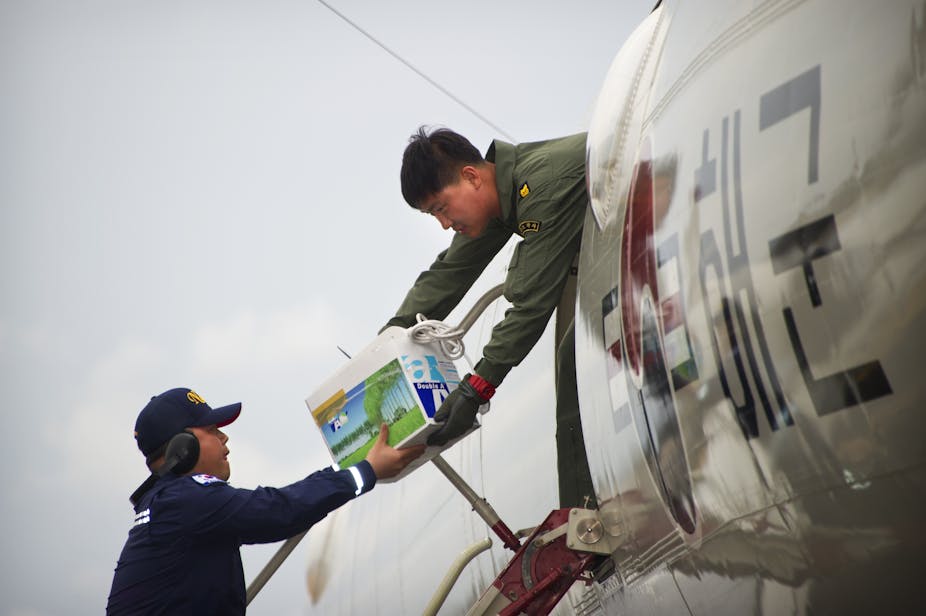The tragic disappearance of Malaysia Airlines flight MH370 has revealed some important things about China’s relations with its neighbours. The levels of tension between the states is a lot lower than some have suggested. In fact, the key political outcomes of this disaster have been the regional co-operation in East Asia and subdued criticism of Malaysia by the Chinese government.
But if the official criticism by China’s government has been muted, the frustrations of grieving relatives (the majority of whom are Chinese) is something even Beijing cannot keep a lid on.
It’s well established that co-operation helps countries deal with disasters – this has been demonstrated countless times, recently in the Sichuan earthquake of 2008, the Tokohu earthquake and tsunami of 2011 and the Haiyan typhoon last year. These disasters each affected just one country, but East Asian neighbours co-operated in the relief efforts.
The search for the missing flight MH370 has taken this co-operation to a whole new level. While most passengers came from mainland China, others on board included Malaysian, Indonesian and Taiwanese citizens, among others. The drawn-out mystery surrounding the route taken by the flight widened the search area significantly, which meant that air forces and navies of several East Asian countries, along with civilian rescue teams, have had to work together in the search for the missing aircraft. It’s a promising sign of co-operation in a region that is riddled with territorial disputes.
Gunboats and diplomacy: China’s navy
Unsurprisingly, China’s decision to deploy several vessels has attracted most attention. Beijing has been following a military modernisation programme for several years now. This programme is a logical development for a rising power. Yet, it has attracted criticism due to an alleged opacity about the intentions of the Chinese government.
Beijing’s new-found willingness to deploy its military further afield – whether it is to support search missions, to counter piracy or to rescue Chinese citizens trapped in civil conflicts – will only make this a more common feature of international politics. When Chinese citizens are involved, Beijing will try to use all necessary means to take care of the situation, including working with other countries.
Because the majority of the passengers on board flight MH370 were Chinese and it was a Malaysian Airlines flight headed from Kuala Lumpur to Beijing, the tragedy has the potential to disrupt relations between the two countries. Interestingly, the Chinese government’s criticism of Malay authorities has been rather restrained. China’s Ministry of Foreign Affairs and Xinhua News Agency have called for the Malay government to be more transparent and to act more decisively. More than two weeks after the plane disappeared, the Chinese government also dispatched deputy foreign minister Zhang Yesui to Kuala Lumpur to obtain more information about the missing aircraft.
But the criticism and the late dispatch of an envoy amount to little more than a slap on the wrist. China has continued to co-operate with Malaysian authorities in the search for the missing plane. Thailand, by contrast, withheld information from them for over a week. The reason given was that Kuala Lumpur had not asked for it. Meanwhile, Vietnam even scaled back its rescue efforts for a while due to a disagreement with the way Malay authorities were communicating new information.
Domestic strife
But it’s a different story among the public. Distressed relatives of the missing Chinese passengers have been very vocal in their criticism of the way Malaysia has handled the crisis and particularly critical of the limited information provided by Malay authorities. Kept in a hotel for almost three weeks, they have also started to press the Chinese government to forcefully ask Kuala Lumpur to devote more resources to the rescue effort and to communicate with them more regularly.
These protests have led some commentators and media outlets to speculate about the willingness of China’s Communist Party to “tolerate” criticism of Malaysia. This assumes that the party can somehow contain or direct protests by its citizens, of which there is scant evidence at best. The Xi Jinping government can be more or less responsive to its citizens’ grievances, or give them space in the state-controlled media. But it cannot stop understandably distraught relatives from expressing their anger and frustration. This is beyond the control of China, as much as any other government.
Ultimately, the mystery surrounding flight MH370 shows that Beijing has to deal with regional, bilateral and domestic dynamics over which it lacks sufficient control. This tragedy, however, has shown that the Chinese government is more willing to co-operate and less intent on scoring political points than is generally assumed.

